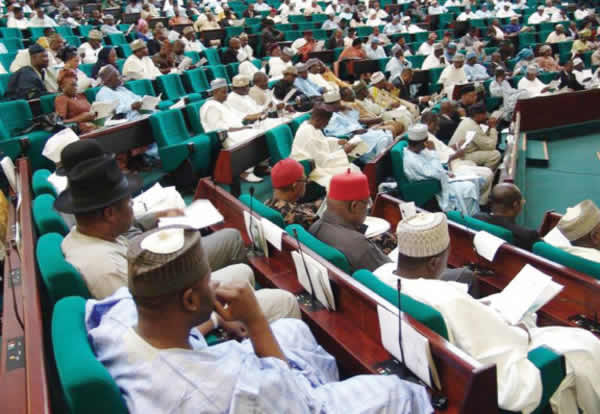Sen. Udoma Udo Udoma, Minister of Budget and National Planning, says the nation’s 2019 budget has a funding gap of N102.83 billion.
The minister said that the increase was made by the National Assembly (NASS).
He said this during the public presentation of the approved 2019 budget on Tuesday in Abuja.
The 2019 Appropriation Bill was presented to NASS by President Muhammadu Buhari on Dec. 19, 2018, passed by NASS and transmitted to the President on May 9 and signed into law on Monday.
Udoma said that by increasing the size of the budget and reducing proposed borrowing, NASS created the unfunded deficit.
“Executive revenue assumptions were generally approved and adopted by NASS, except for unexplained increases totaling N31.5 billion on some non-oil revenue lines.
“NASS increased the budget size from N8.83 trillion to N8.92 trillion translating to an increase of N90.33 billion.
“This has resulted in an overall increase of N58.83 billion in deficit. Inexplicably, NASS reduced the proposed borrowing from N1.649 trillion to N1.605 trillion, thus creating an overall unfunded deficit of N102.83 billion.
“To fully fund the budget, the level of borrowing may therefore have to increase.”
He said that the overall budget deficit was N1.918 trillion as against N1.859 trillion in the executive proposal, representing 1.37 per cent of the Gross Domestic Product (GDP).
Udoma added that the deficit would be funded mainly by borrowing N1.605 trillion split equally between domestic and foreign borrowing.
According to him, allocations for some executive projects based on critical appraisals and linked to the Economic, Recovery and Growth Plan (ERGP) have been reduced and a large number of new projects, mainly constituency type projects have also been introduced.
He, however, said that Buhari would engage the leadership of the ninth NASS, as soon as it emerges to effect any necessary amendments to ensure the budget was implemented.
The minister said that the president would also seek the support of NASS to ensure a smoother, faster budget process that would return the nation to a January-December fiscal year.
For revenue, Udoma said it was projected at N6.97 trillion, consisting of oil revenue projected at N3.73 trillion while non-oil revenue was estimated at N1.39 trillion.
He said that the estimate for non-oil revenue consisted of N799.52 billion from Companies Income Tax (CIT), N229.34 billion from Value Added Tax (VAT) and Customs Duties of N302.55 billion.
According to Udoma, the Federal Government has also sustained its efforts to improve public financial management.
This he noted was done through the comprehensive implementation of the Treasury Single Account (TSA), the Government Integrated Financial Management Information System (GIFMIS) and the Integrated Payroll and Personnel Information System (IPPIS).
He said that the president had directed that immediate action should commence to restructure the Joint Venture Oil Assets to reduce government shareholding to not less than 40 per cent, an exercise that must be completed within the 2019 fiscal year.
Udoma said that the N710 billion from Oil Joint Venture Asset restructuring and N320 billion from revision of the Oil Production Sharing Contract legislation/terms that were not actualised as revenue in 2018 would be rolled over to 2019.
“The Department of Petroleum Resources is now concluding efforts on the collection of past-due oil license and royalty charges.
“Following the president’s directive, the Ministry of Finance, working with all the relevant authorities, has been authorised to take action to liquidate all recovered, unencumbered assets.
“Given the improved oil prices and production levels, Nigerian National Petroleum Corporation (NNPC) is to immediately commence the recovery of all outstanding obligations, including those due from Nigerian Petroleum Development Company (NPDC) (a subsidiary of NNPC), which it had agreed to pay since 2017.”
He said that Buhari had also directed that work should be concluded on the deployment of the National Trade Window and other technologies to enhance Customs collections efficiency.
Speaking on other issues, he said the nation could expect reduction in the rate of unemployment, as the Federal Government continues to implement the policies and programmes of the ERGP which were directed at creating more diversified and inclusive growth.
Udoma said that the budget which was tagged “Budget of Continuity” was designed to further reposition the economy on the path of higher, inclusive, diversified and sustainable growth.
It is to also continue to lift significant number of Nigerians out of poverty.
He, however, thanked NASS for approving the assumptions of the budget without making any changes to them.
The News Agency of Nigeria (NAN), reports that the budget was predicated on oil production of 2.3 million barrels per day at 60 dollars per barrel and an exchange rate of N305 per dollar.
GDP is expected to grow at 3.01 per cent, while inflation rate is expected to be 9.98 per cent. (NAN)

